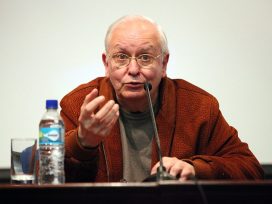“To say that reason is only desiccating and too dry is a dangerous caricature. No less dangerous is to eliminate the place for arts, for myth, which is a different kind of knowledge of the world. We have to be cautious about both dangers, both reductions.” On the publication of his new book In Defence of the Enlightenment, Tzvetan Todorov tells British philosopher AC Grayling why the Enlightenment must be separated from scientism and cultural chauvinism.
Articles
Read more than 6000 articles in 35 languages from over 90 cultural journals and associates.
The few regulatory measures introduced since the financial collapse in 2008 are being supervised by the same banking sector that caused it in the first place, writes Financial Times journalist Lucas Zeise. Governments’ delegation of regulatory responsibilities has deeply negative implications for democracy.
Only a small “creative class” achieves the creativity and freedom attributed by stereotype to all knowledge workers, writes Christopher Newfield. Below this elite exist far more numerous “perma-temps”, who are highly qualified yet interchangeable. In the American university system, which has parallels in Europe, recipients of higher education are increasingly prepared for a working life in a knowledge economy where independence and social protections have been eroded.
350 million do it regularly. It offers levels of complexity and human interaction beyond any other art form. We can’t continue to ignore the cultural impact of online gaming, says Michael Bywater.

The defender of contingency
An interview with Ernesto Laclau
Ernesto Laclau talks to the Greek journal Intellectum about the uses of populism, why radical democracy has nothing to do with liberalism, and how lack of political competition benefits the far-Right.
Obama’s proposed banking reforms are likely to face insurmountable opposition from Congress, where lobby interests have become all-powerful. Worse still, writes George Blecher, the proposals themselves don’t go far enough.

“Democracy” in post-communist Europe is strongly associated with high levels of state-sponsored social protection, indicating a culture far removed from the prevalent system of market-mediated private provision. The dissatisfaction with democracy expressed by the many not to have benefited from transition suggests CEE welfare states have a long way to go before they attain western levels of credibility. Their democracies depend on that gap being bridged.
Mira Meksi regrets the state of philosophy publishing Albania: secondary literature abounds but the original works themselves remain untranslated, and publishers operate a scattergun approach, lacking any sense of historical development in the field and responding entirely to intellectual fashion.
Jytte Klausen’s book “The Cartoons That Shook the World” (published by Yale University Press) is the first scholarly examination of the notorious controversy that erupted in 2006. Three years ago, she set out to unravel the genesis of the debacle and to analyse the cartoons and their impact. Last summer, several months before publication, Yale University Press unexpectedly took the decision not to publish the cartoons in her book.
Kafka’s home city has a lot to hide, writes James Hawes. The Czech capital’s architectural debt to greater Germany; its authoritarian past and history of anti-Semitism; even its most famous son’s penchant for pornography – these unwelcome truths are bad for business.
The Swiss vote to ban minarets has less to do with a “populist factor” inherent in referenda than with resentment at high-level corruption and the fear of social declassification. Celebrated by rightwing parties across Europe, the vote augurs more popular Islam-baiting to come.
The revenge of the beer fiddlers?
The regulation of amateurs in musical life
Cultural sociology has frequently described the growing professionalization of culture as an inevitable manifestation of socio-economic rationalization. Yet the persistence of the amateur in contemporary culture contradicts this picture, writes Rasmus Fleischer. The three hundred year-old struggle between professional and amateur musicians in Sweden shows that cultural professionalism is not a simple expression of an all-embracing economic logic, but generated and sustained by specific institutions.
Kigali's ambassador-at-large
How Philip Gourevitch wrote the victors' history book
With his book about the Rwandan genocide, Philip Gourevitch has perhaps more than anyone influenced the way the conflict is viewed in the US and Europe. But his view is clouded by over-simplifications and a glorified view of the Kagame government, writes Swedish journalist Felix Holmgren.
The forgotten slaughter
An interview with Marie Béatrice Umutesi
Both Hutus and Tutsis committed crimes against humanity in the conflict in Rwanda, says author Marie Béatrice Umutesi in conversation with Swedish journalist Felix Holmgren. The international community first betrayed the Tutsis, then the Hutus.
Whereas in postmodernism, being was left in a free-floating fabric of emotional intensities, in contemporary culture the existence of the self is affirmed through the network. Kazys Varnelis discusses what this means for the democratic public sphere.